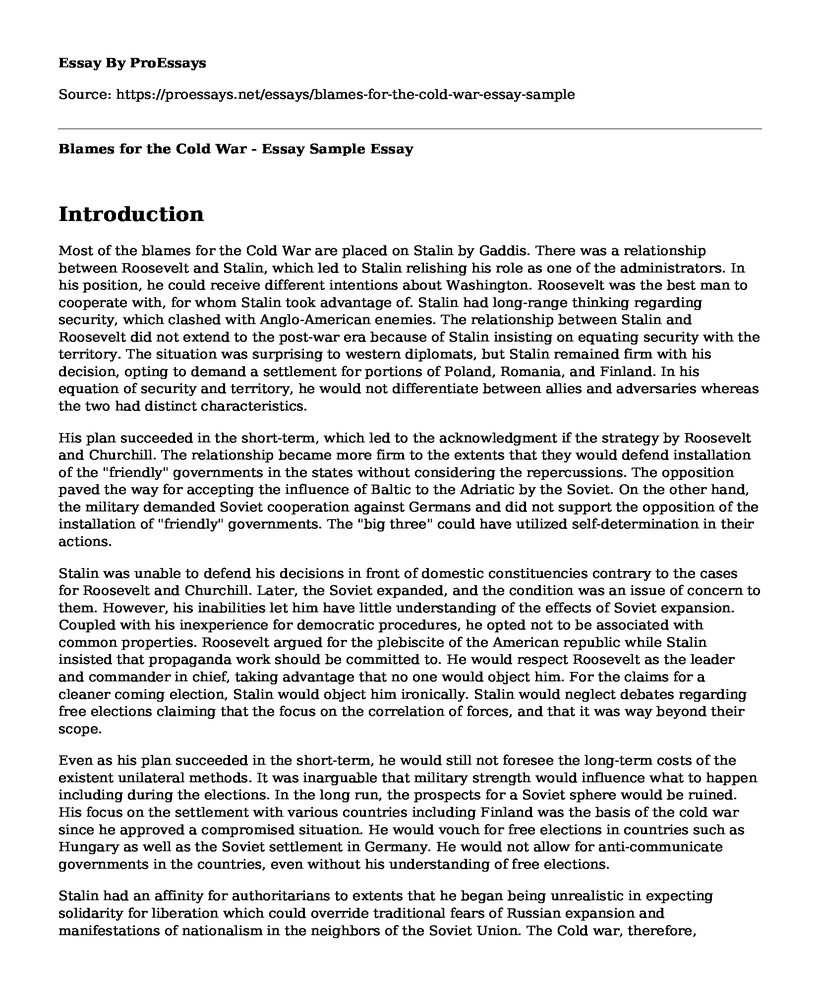Introduction
Most of the blames for the Cold War are placed on Stalin by Gaddis. There was a relationship between Roosevelt and Stalin, which led to Stalin relishing his role as one of the administrators. In his position, he could receive different intentions about Washington. Roosevelt was the best man to cooperate with, for whom Stalin took advantage of. Stalin had long-range thinking regarding security, which clashed with Anglo-American enemies. The relationship between Stalin and Roosevelt did not extend to the post-war era because of Stalin insisting on equating security with the territory. The situation was surprising to western diplomats, but Stalin remained firm with his decision, opting to demand a settlement for portions of Poland, Romania, and Finland. In his equation of security and territory, he would not differentiate between allies and adversaries whereas the two had distinct characteristics.
His plan succeeded in the short-term, which led to the acknowledgment if the strategy by Roosevelt and Churchill. The relationship became more firm to the extents that they would defend installation of the "friendly" governments in the states without considering the repercussions. The opposition paved the way for accepting the influence of Baltic to the Adriatic by the Soviet. On the other hand, the military demanded Soviet cooperation against Germans and did not support the opposition of the installation of "friendly" governments. The "big three" could have utilized self-determination in their actions.
Stalin was unable to defend his decisions in front of domestic constituencies contrary to the cases for Roosevelt and Churchill. Later, the Soviet expanded, and the condition was an issue of concern to them. However, his inabilities let him have little understanding of the effects of Soviet expansion. Coupled with his inexperience for democratic procedures, he opted not to be associated with common properties. Roosevelt argued for the plebiscite of the American republic while Stalin insisted that propaganda work should be committed to. He would respect Roosevelt as the leader and commander in chief, taking advantage that no one would object him. For the claims for a cleaner coming election, Stalin would object him ironically. Stalin would neglect debates regarding free elections claiming that the focus on the correlation of forces, and that it was way beyond their scope.
Even as his plan succeeded in the short-term, he would still not foresee the long-term costs of the existent unilateral methods. It was inarguable that military strength would influence what to happen including during the elections. In the long run, the prospects for a Soviet sphere would be ruined. His focus on the settlement with various countries including Finland was the basis of the cold war since he approved a compromised situation. He would vouch for free elections in countries such as Hungary as well as the Soviet settlement in Germany. He would not allow for anti-communicate governments in the countries, even without his understanding of free elections.
Stalin had an affinity for authoritarians to extents that he began being unrealistic in expecting solidarity for liberation which could override traditional fears of Russian expansion and manifestations of nationalism in the neighbors of the Soviet Union. The Cold war, therefore, intensified between 1947 and 1948 and the communist governments by Russia were established in Poland, Hungary, and Czechoslovakia. At this time there was a Republican-controlled Congress, and Stalin had no constraints regarding the democratic electoral system of checks and balances.
Cite this page
Blames for the Cold War - Essay Sample. (2022, Dec 19). Retrieved from https://proessays.net/essays/blames-for-the-cold-war-essay-sample
If you are the original author of this essay and no longer wish to have it published on the ProEssays website, please click below to request its removal:
- Essay on the U.S. History: Colony or Independence
- The Conquest of Alexander the Great, His Legacy and Impact on Persia, India, and Egyp Essay
- Essay Example on American Civil War: Conflict that Shaped and Preserved the Nation
- Essay Example on British Colonies Outperform French and Spanish: An Analysis
- Cold War: US and USSR Post-WWII Global Politics - Essay Sample
- Essay Sample on WWII Tech Advances: Post-War Benefits for Health & Beyond
- Essay Sample on Hart-Cellar Act 1965: Reuniting Families & Attracting Skilled Labor







